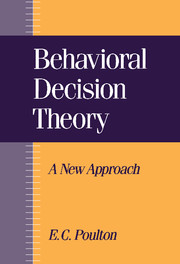Book contents
- Frontmatter
- Acknowledgments
- Contents
- Preface
- Chapter 1 Outline of heuristics and biases
- Chapter 2 Practical techniques
- Chapter 3 Apparent overconfidence
- Chapter 4 Hindsight bias
- Chapter 5 Small sample fallacy
- Chapter 6 Conjunction fallacy
- Chapter 7 Regression fallacy
- Chapter 8 Base rate neglect
- Chapter 9 Availability and simulation fallacies
- Chapter 10 Anchoring and adjustment biases
- Chapter 11 Expected utility fallacy
- Chapter 12 Bias by frames
- Chapter 13 Simple biases accompanying complex biases
- Chapter 14 Problem questions
- Chapter 15 Training
- Chapter 16 Overview
- References
- Index
Chapter 15 - Training
Published online by Cambridge University Press: 06 July 2010
- Frontmatter
- Acknowledgments
- Contents
- Preface
- Chapter 1 Outline of heuristics and biases
- Chapter 2 Practical techniques
- Chapter 3 Apparent overconfidence
- Chapter 4 Hindsight bias
- Chapter 5 Small sample fallacy
- Chapter 6 Conjunction fallacy
- Chapter 7 Regression fallacy
- Chapter 8 Base rate neglect
- Chapter 9 Availability and simulation fallacies
- Chapter 10 Anchoring and adjustment biases
- Chapter 11 Expected utility fallacy
- Chapter 12 Bias by frames
- Chapter 13 Simple biases accompanying complex biases
- Chapter 14 Problem questions
- Chapter 15 Training
- Chapter 16 Overview
- References
- Index
Summary
Summary
Of the investigations described in this book, 4 show that trained experts perform better in their area of expertise than do ordinary respondents, who are usually untrained students. Another 4 investigations show that statistically trained students perform better on tests of probability than do statistically naive students. In addition, 6 investigations show that a relatively brief training in the laboratory can improve untrained people's dealing with probabilities.
Training improves dealing with probabilities
The results reported in this book demonstrate that many untrained people fail to deal with probabilities correctly, and that they can be trained to perform better. The picture is fairly typical of the literature on dealing with probabilities (Edwards, 1983, p. 508; Phillips, 1983 p. 526). However, the results do not abolish the need to investigate the effects of training. In everyday life novel tasks often have to be performed without special training. It is important to find out what heuristics untrained people use, how quickly they learn the normative rules, and how successfully they then apply them.
Experts
Entry 1.1 A in Table 15.1 (Lichtenstein and Fischhoff, 1980a, Table 1; see Chapter 3, Employ trained experts) describes the performance of 8 experts in subjective probability. The experts do not show apparent overconfidence in their answers to 2-choice general knowledge questions, when using a one-sided rating scale with probabilities ranging only from .5 through 1.0.
- Type
- Chapter
- Information
- Behavioral Decision TheoryA New Approach, pp. 276 - 285Publisher: Cambridge University PressPrint publication year: 1994



